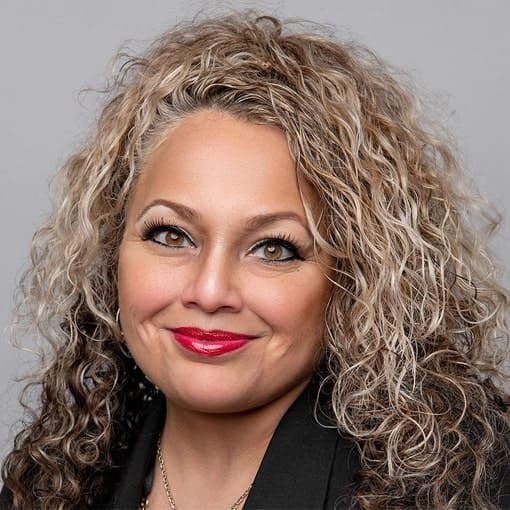What would you do if you encountered someone standing on a ledge, either physically or metaphorically, one step away from ending their life? Would you know how to talk to them? And what words to say?
In March 2023, Gloria Segovia and Mirella Corallo co-presented an ASIST suicide intervention workshop at AERCs Orangeville to share the world’s leading Applied Suicide Intervention Skills Training (ASIST) program with their peers. LivingWorks is the world leader in suicide prevention training solutions and requires two certified instructors present the learning materials. Gloria and Mirella are qualified trainers and bring a lot of life experience to their roles as learning facilitators. Gathered around them in the room are the people who’d like to know the right words to say to convince people to step down off the ledge, and who are training themselves and taking steps to be prepared should they ever encounter someone who needs them to be at their very best.
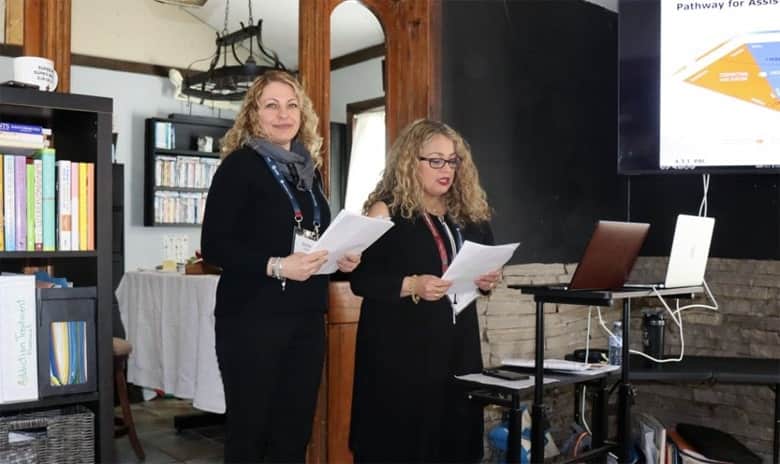
Mirella Corallo and Gloria Segovia lead the study group reading the course materials.
LivingWorks Applied Suicide Intervention Skills Training (ASIST) is a two-day interactive workshop addressing suicide first aid. ASIST teaches participants how to recognize when someone may be having suicidal thoughts and sets guidelines to help shape the encounter with an eye on producing the best results. It’s our mission to get the jumper to step away from immediate danger and go to therapy for long term safety.
LivingWorks started in Calgary in 1983 when four men with diverse backgrounds in psychiatric counseling and social work laid down what they believed was the best way to talk that troubled person off the ledge. They made a model to stop suicide by convincing a suicidal person to choose life. Richard Ramsay, Bryan Tanney, Roger Tierney, and Bill Lang were motivated to create the first training module because they saw and felt the need for such a solution. Previous to its introduction, almost forty years ago now, they observed a lack of suicide -prevention tools and skills among laypeople and professionals in their health communities. They all had ideas on the best approach and together they developed the precursor to the current LivingWorks ASIST program, as well as the Train-the-Trainer model which is still used today to disseminate the knowledge. Their wisdom spread across Canada and the United States, to Australia, and beyond the English-speaking world. The four founders’ partnered and became LivingWorks, a social enterprise dedicated to building a world free of suicide.
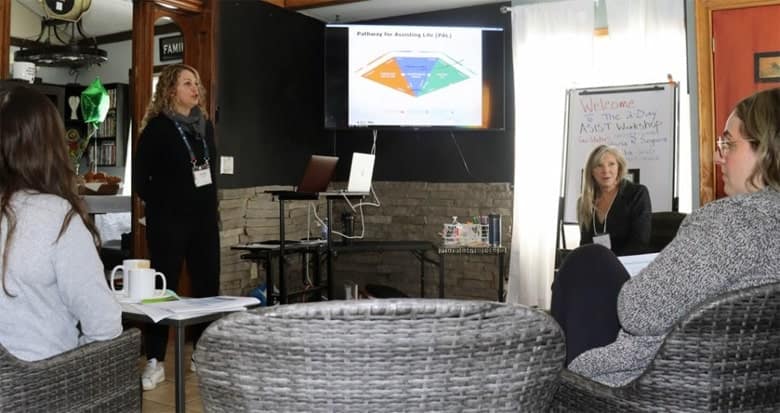
Mirella Corallo discuss PAL – Pathway for Assisting Life and the three stages of a therapeutic journey to choose life.
LivingWorks ASIST is a two-day face-to-face workshop with provocative audiovisuals, impassioned discussions, and realistic simulations. The program addresses a critical need for suicide intervention skills in many workplaces and communities. Most of the participants in this room have been touched personally by suicide and they have lost someone they knew to this deadly mental illness. Sharing personal stories is part of the exercise. In many cases they were powerless to stop the event from happening, but now, equipped with this information and knowing these protocols, they might be better able to spot the signs in advance and take remedial steps before the sufferer reaches the ledge.
PAL – Pathway for Assisting Life is a map for Difficult Discussions
Interveners, as we are called, use PAL to navigate the high stakes conversation that occurs on or near the ledge. We are shown how to explore invitations, ask about suicide (to name it), and how to listen and process the sufferer’s story. We’re always on the look-out for opportunities to support a turn to safety. Together we might try to develop a plan with the necessary confirmations. Individuals who are suicidal are often ambivalent about living and dying and have doubts about whether suicide is the best solution to their problems. We can tap into these doubts as we work toward a successful intervention.
Two accredited LivingWorks trainers, Mirella Corallo and Gloria Segovia helped the class absorb and better understand the course material. LivingWorks trainers come from a wide variety of backgrounds and life experiences. The company writes in their brochures that there is no single “type” that’s predisposed to success as instructor. Good qualities include the ability to present and facilitate learning. Add skills like patience, and a genuine willingness to talk about suicide, and having an “always learning” mindset and the instructor will get even better with experience. Trusted by mental health professionals, yet learnable by anyone, LivingWorks Applied Suicide Intervention Skills Training (ASIST) is the only workshop of its kind in Canada. It will never be obsolete because it’s continually being updated to reflect new knowledge and approaches. The course materials has been empowering people to provide life-saving interventions for over thirty five years.
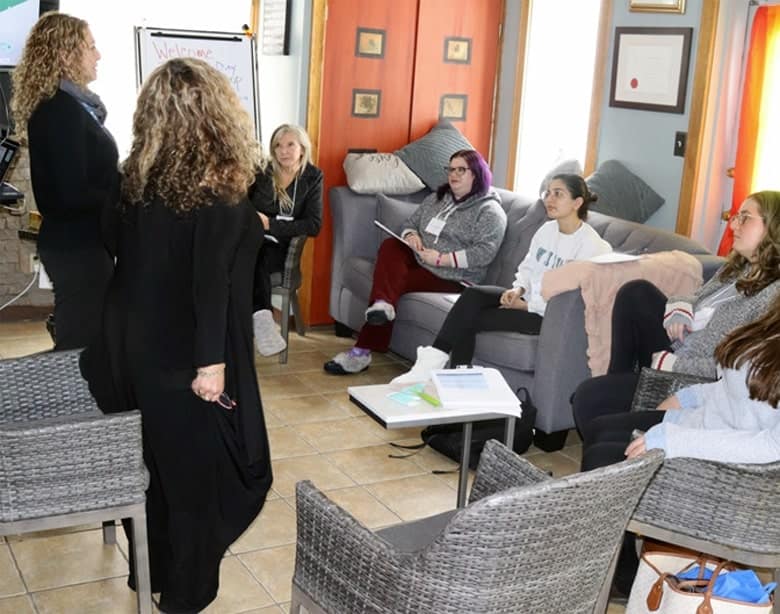
Mirella Corallo role-plays with Gloria Segovia, acting out a suicide-related conversation.
LivingWorks ASIST course materials include case studies which present the personas of people in need in different circumstances. There is a man named Jack, and another named Henry, and a girl, Christina are all very troubled people. All three are suicidal, but yet they’re all different with unique personalities and life experiences. While the exact same approach might not work with all of them, the guidelines remain constant. The formula for reaching and connecting with them is the same regardless of their age, gender, race or religion. The workshop teaches participants how to recognize the signs of someone in need of support, and how to provide a skilled intervention before they get to the ledge, and what to do if they’re on the ledge and how to develop a long term plan to increase the safety of people at risk.
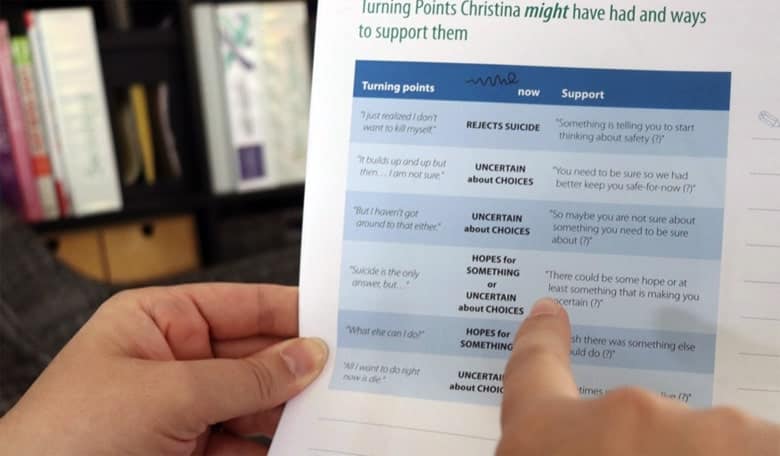
ASIST suicide training workshop lists options for how to respond to people in need.
LivingWorks ASIST is an effective recipe to counter suicide. To talk someone down off the ledge requires the intervener address their fears and relieve their pain. If we choose to help, we must first assuage their fears of us and the situation, and we should listen for clues to help us process their experience and the path that has led them to this place. Although ASIST is widely used by healthcare providers, participants don’t need any formal training to attend the workshop. Since its development in 1983, ASIST has received regular updates to reflect improvements in knowledge and practice, and over a million people have taken the workshop. Studies show that the ASIST method helps reduce suicidal feelings in those at risk and is a cost-effective way to help address the problem of suicide.
LivingWorks ASIST is an evidence-based teaching model. The website states that over thirty peer-reviewed studies and government reports have found the program improves participants’ skills and readiness should they encounter people in crisis. It’s safe for participants too, with no adverse effects from the training being credited in the studies. Any resulting interventions are shown to increase hope and reduce suicidality. Overall, ASIST training has been shown to increase general counseling and listening skills, and is cost effective because of course saving lives yields an immeasurable return on investment.
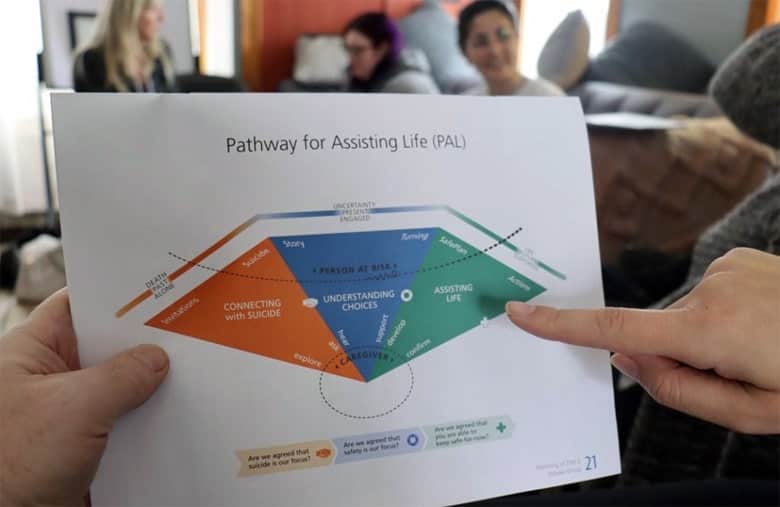
The ASIST Suicide Prevention Training Workshop Pathway for Assisting Life (PAL).
What are the outcomes of Applied Suicide Intervention Training?
Over the course of our two-day workshop, we learned how to better understand all the ways that personal and societal attitudes affect our views on suicide and interventions. Our trainers shared stories and guidance and gave a sincere suicide first aid course. We learned what tools work best in which circumstances and how to recognize a person at risk and the best ways to meet their individual safety needs. We learned how to identify the key elements of an effective suicide safety plan, and the actions required to implement the most important elements. We grew to appreciate the value of integrating suicide prevention resources into our health communities at large, and to utilize other important aspects of suicide prevention including life-promotion and self-care.
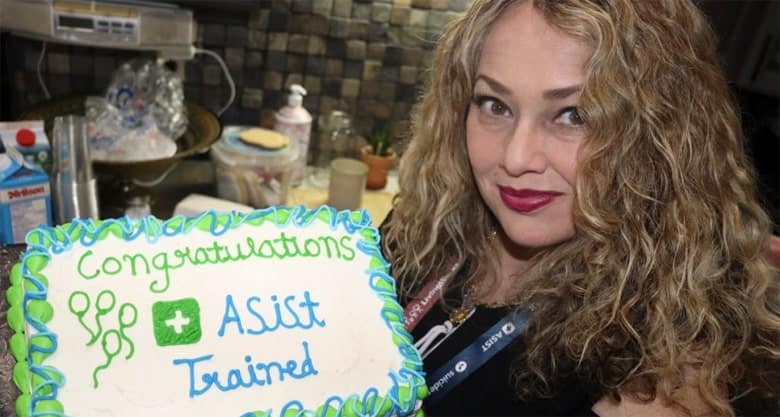
Gloria Segovia at the conclusion of the ASIST workshop held at the AERCS Orangeville location.
On Sunday afternoon, at the conclusion of our intense two-day workshop experience, we celebrated our achievement and treated ourselves to a slice of delicious ASIST-themed lemon lime cheesecake.

